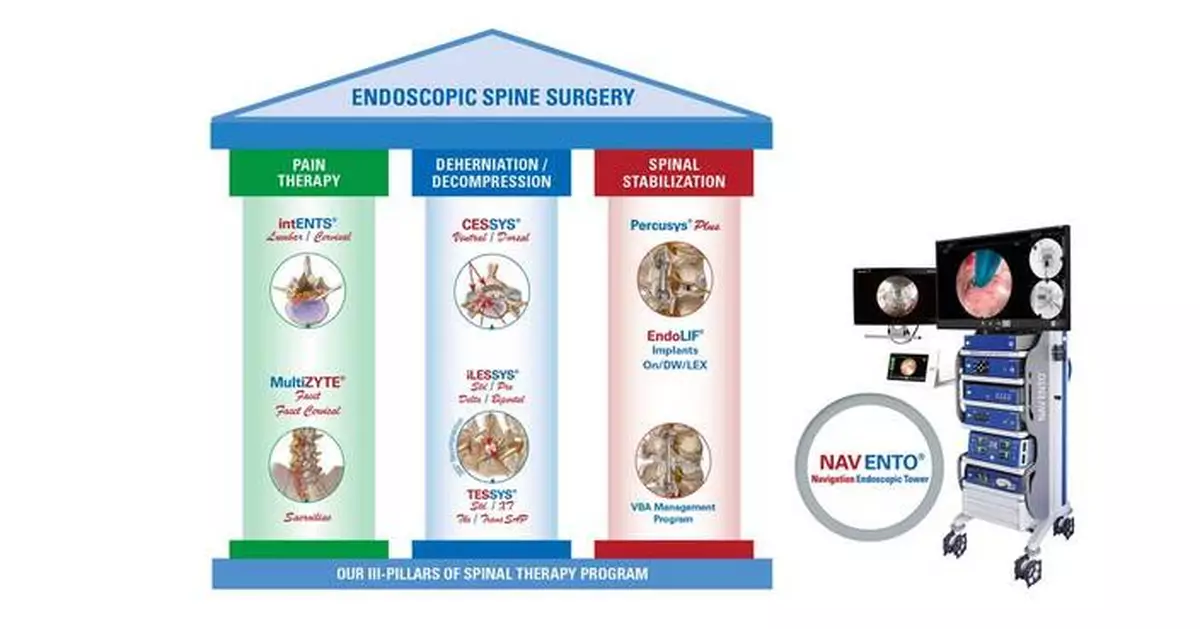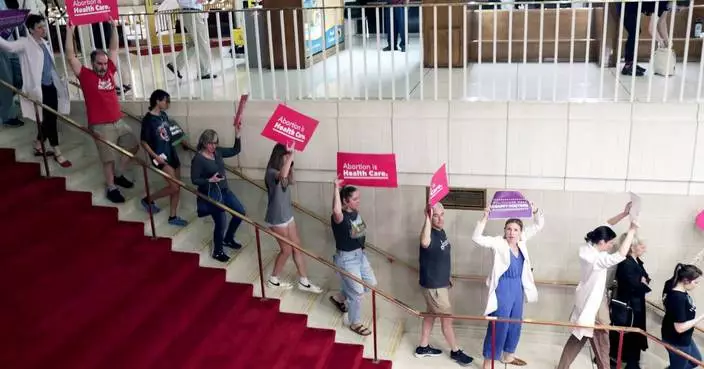KARLSRUHE, Germany--(BUSINESS WIRE)--Apr 25, 2024--
German-based joimax®, the market leader in technologies and training methods for full-endoscopic and minimally invasive spinal surgery, is excited to announce the full registration of all its products for India, one of the fastest growing endoscopic spine surgery markets worldwide.
This press release features multimedia. View the full release here: https://www.businesswire.com/news/home/20240425620967/en/
The Indian registration includes all joimax® Class II and III, as well as Class I instruments, which were approved in 2023. Now, the Indian health community has access to all the latest spinal endoscopic technologies invented, developed and manufactured by joimax®.
“India is the biggest country in the world; it’s ready for emerging technology businesses like endoscopic spinal surgery,” states Santhosh Mechery, Director Spectramed Healthcare (P) Ltd. “We can’t wait to roll-out the complete joimax® portfolio in our country and enable so many patients to profit from this innovative, minimally invasive endoscopic spine surgery.”
“Earlier this year, joimax® received its CE MDR approvals, granted by TÜV-South — an important step for marketing our existing products under the new European regulation, which opened a backlog of products to India,” states joimax® Founder and CEO Wolfgang Ries. “We’re already active in more than 60 countries! These partners are eager to launch the newest joimax® treatment technologies.”
In Fall 2022, joimax®, in cooperation with Spectramed Healthcare, launched its education and training program, Endoscopic Spine Academy (ESPINEA®), in India, which has since been rolled out worldwide. ESPINEA® was founded in 2019, accredited by the Royal College of Surgeons of Edinburgh in 2020, and this year, is celebrating its 5 th anniversary. The program allows for the highest quality training of joimax® products in any market, serving as a hands-on learning facility for endoscopic spinal surgery.
About joimax ®
Founded in Karlsruhe, Germany in 2001, joimax ® is the leading developer and marketer of complete systems for full-endoscopic and minimally invasive spinal surgery. With the Endoscopic Surgical Systems TESSYS ® (transforaminal), iLESSYS ® (interlaminar) and CESSYS ® (cervical) for decompression procedures, MultiZYTE ® for facet and sacroiliac joint pain treatment, EndoLIF ® and Percusys ® for minimally invasive endoscopically assisted stabilizations, established systems are provided, addressing a whole range of indications. All methods are supported by the latest generation electronical devices in the all new NAVENTO ® navigated endoscopic tower. In procedures for herniated discs, stenosis, pain therapy or spinal stabilization treatment, surgeons utilize joimax ® technologies to operate through small incisions under local, conscious sedation or full anesthesia, via tissue and muscle-sparing corridors, and through natural openings in the spinal canal, e.g., the intervertebral foramen, the so-called “Kambin triangle”.
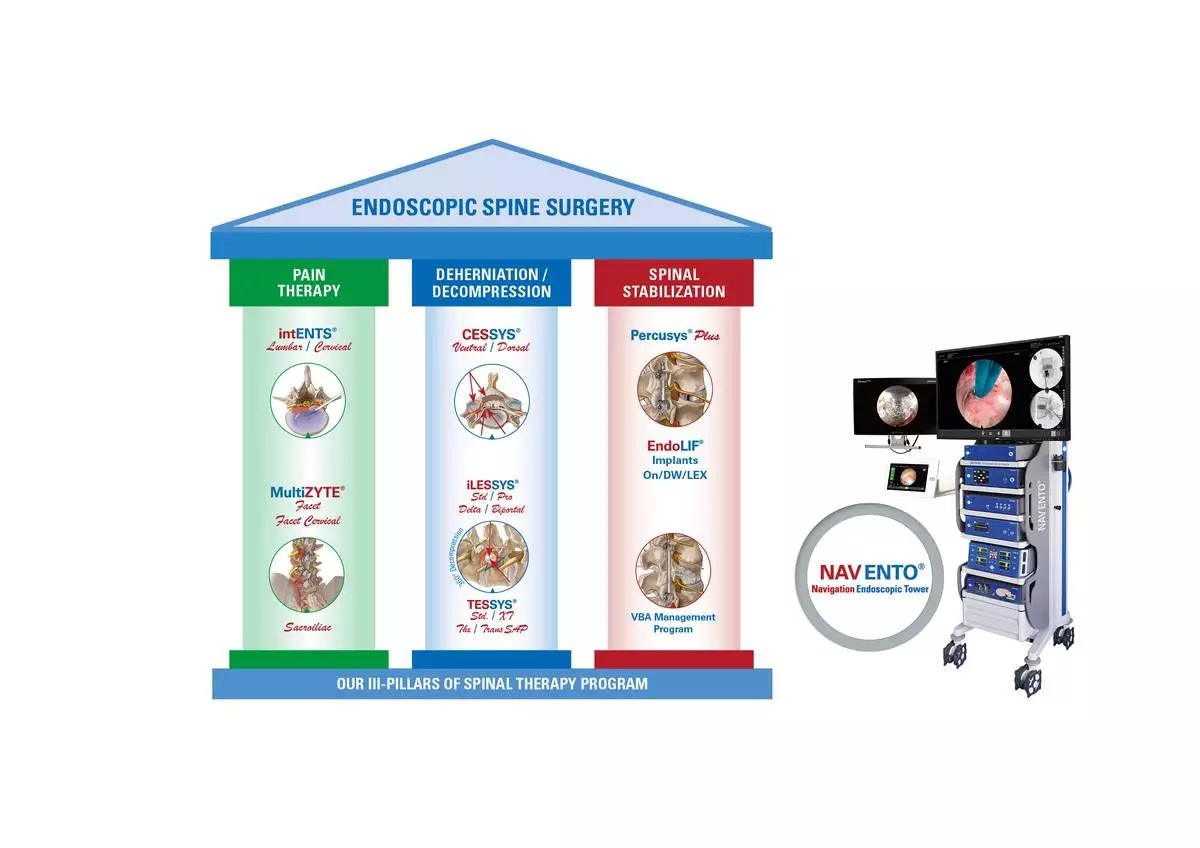

The three pillars of the joimax® spinal therapy program. (Graphic: Business Wire)
KIBBUTZ MEFALSIM, Israel (AP) — When Hamas fighters invaded southern Israel on Oct. 7, the militant group that rules the Gaza Strip perpetrated the deadliest attack on Jews since the Holocaust.
So this year’s Holocaust Remembrance Day, which begins on Sunday evening in Israel, carries a heavier weight than usual for many Jews around the world.
For Judith Tzamir, a Holocaust survivor from Germany who moved to Israel in 1964, the horrors of Oct. 7 prompted her to mark the somber holiday by making a pilgrimage she has long avoided: She will visit Auschwitz, the Nazi concentration camp in Poland.
Tzamir, whose kibbutz fended off Hamas attackers on Oct. 7, will join 55 other Holocaust survivors from around the world and about 10,000 others participating in the March of the Living. The event recreates the 2-mile (3-kilometer) march from Auschwitz to Birkenau, where approximately 1 million Jews were killed by Nazi Germany.
The event, now in its 36th year, usually draws thousands of participants, including Holocaust survivors and Jewish students, leaders and politicians. This year, Israeli hostages released from captivity in Gaza and families whose relatives are still being held captive will also join the march.
“I don’t know if the world will listen, but even for myself, it’s important,” said Tzamir, who had turned down past invitations to visit Auschwitz. “To remember that there’s still antisemitism around, and there are still people who will kill just for religious reasons.”
Holocaust Remembrance Day, marked on the anniversary of the outbreak of the Warsaw Ghetto Uprising, has traditionally been a time for Israelis to gather and listen to testimony from survivors.
It is one of the most somber days of the year — highlighted by a two-minute siren when traffic halts and people stand at attention in memory of the victims. Memorial ceremonies are held throughout the day, and names of victims are recited. While Israel’s national Holocaust memorial, Yad Vashem, tries to steer clear of politics, its ceremony this year includes an empty yellow chair in solidarity with the Israeli hostages still held in Gaza.
In 1948, when Tzamir was 4 1/2 years old, the people she knew as her parents dressed her in a light blue dress, with black shoes and white socks, and took her to a plaza in Berlin. She remembers clutching her doll, Yula, when they revealed that they were not her parents and that the woman standing before them was her biological mother.
Tzamir’s mother had hidden her Jewish identity during World War II by serving in the German army. She gave birth to Judith in 1943 in a hospital run by nuns, and left Judith behind to save her life. Tzamir, called Donata at the time, was placed in a foster family. She had no idea she was Jewish until she met her mother.
Sixteen years later, while she was in college, Tzamir went to Mefalsim, a kibbutz in southern Israel on the border with Gaza, through a student-exchange program. After her studies, she returned to Mefalsim, fell in love with a new immigrant from Argentina who was also living on the kibbutz, and stayed, raising four children.
On Oct. 7, Tzamir was faced with the possibility of losing her home once again. Hamas militants poured over the border from Gaza and attacked towns, army bases and a music festival in southern Israel. Mefalsim was luckier than many other kibbutzim in the area, where militants burned homes and left wide swaths of destruction.
The militants killed around 1,200 people that day, mostly civilians, and kidnapped 250 others. The attack sparked the Israeli invasion in Gaza, where the death toll has soared to more than 34,500 people, according to local health officials, and driven around 80% of Gaza’s population of 2.3 million from their homes. The high death toll and humanitarian crisis have prompted genocide accusations against Israel in the International Court of Justice — a charge that Israel angrily rejects.
Hamas has said its attack was aimed against Israeli occupation and its blockade of Gaza, and pro-Palestinian activists deny any antisemitic motives in their opposition to Israel’s military offensive. For most Jewish Israelis, global protests calling for boycotts of Israel and questioning the country’s right to exist often veer into antisemitism.
On the day of the attack, Mefalsim’s emergency preparedness squad was able to hold most of the Hamas militants outside the kibbutz perimeter. Many residents stayed in safe rooms for nearly 24 hours, until the Israeli army was able to evacuate them the next day.
Although there were no fatalities at Mefalsim, its roughly 800 residents were told to leave, along with more than 120,000 Israelis who lived within a few kilometers of the borders with Gaza and Lebanon. Mefalsim, Tzamir's steady anchor after a childhood filled with upheaval and uncertainty, was no longer a safe haven.
Many Mefalsim residents have been living in a hotel north of Tel Aviv the past seven months, uncertain of next steps, though Tzamir and some others hope to return to the kibbutz in June.
Tzamir said the Oct. 7 attack brought up all kinds of memories from her childhood trauma. She could function during the day, but when she went to sleep her dreams were filled with blood and death and fires, visions that reminded her of the bombings she witnessed as a child in Germany.
Tzamir is one of approximately 2,000 Holocaust survivors in Israel who were forced to evacuate from their homes due to the war in Gaza, according to Israel’s Ministry of Welfare and Social Affairs. The ministry estimates that 132,000 Holocaust survivors live in Israel.
Tzamir served as a director of her kibbutz for 13 years, so she knows every resident. She said some families may never return to Mefalsim, just a mile (1.4 kilometers) from the Gaza border. Explosions from Gaza reverberate over the buildings, and the sense of security is difficult to reclaim.
But it was never a question for her, she said.
“I’m 80 years old, I don’t want to lose my home again,” Tzamir said as her husband Ran, busied himself tending to a garden bursting with succulents and flowers, just before their flight to Poland. “We are coming back.”
This story has been corrected to show that the spelling of the kibbutz is Mefalsim.

Judith Tzamir, a Holocaust survivor from Germany, poses for a portrait in the garden of her family home in Kibbutz Meflasim, southern Israel, Friday, May 3, 2024. On Monday, Tzamir will join 55 other Holocaust survivors from Israel and around the world for a memorial march in Poland, called March of the Living. (AP Photo/Maya Alleruzzo)

Judith Tzamir, a Holocaust survivor from Germany, speaks to a journalist in her family home in Kibbutz Meflasim, southern Israel, Friday, May 3, 2024. On Monday, Tzamir will join 55 other Holocaust survivors from Israel and around the world for a memorial march in Poland, called March of the Living. (AP Photo/Maya Alleruzzo)
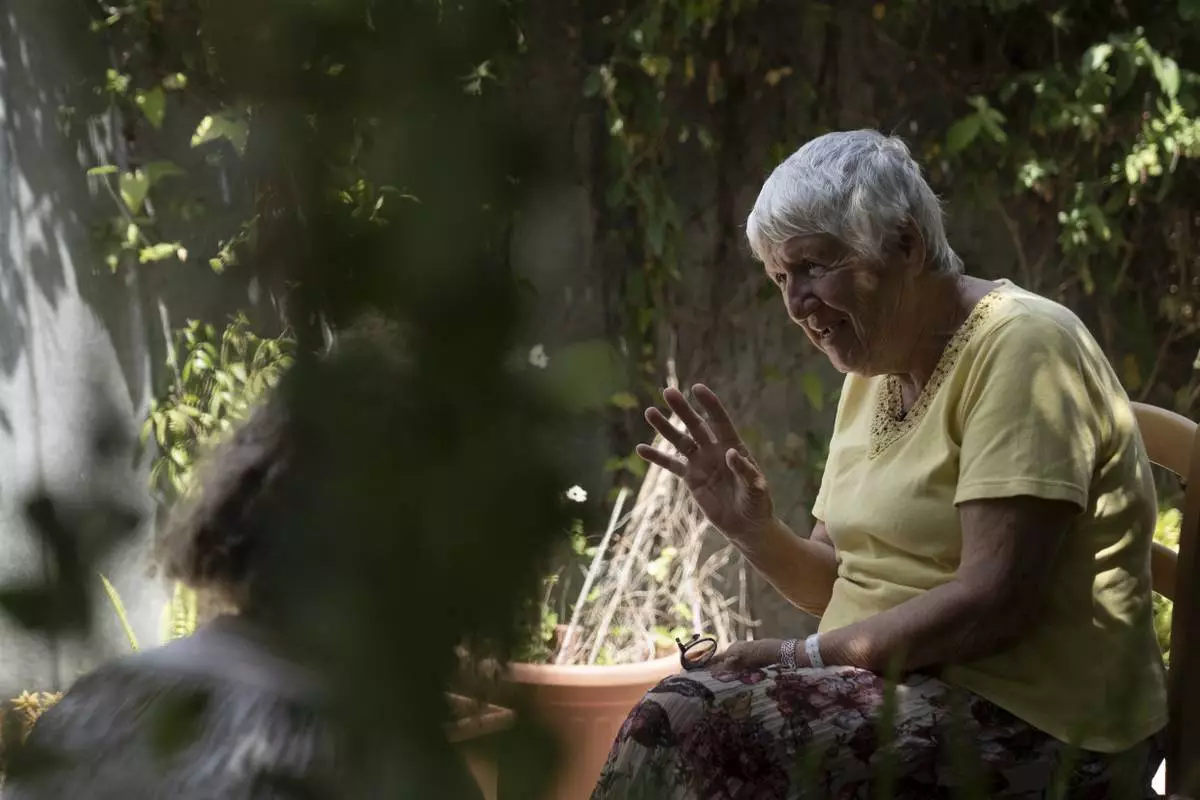
Judith Tzamir, a Holocaust survivor from Germany, speaks to a journalist in her family home in Kibbutz Meflasim, southern Israel, Friday, May 3, 2024. On Monday, Tzamir will join 55 other Holocaust survivors from Israel and around the world for a memorial march in Poland, called March of the Living. (AP Photo/Maya Alleruzzo)
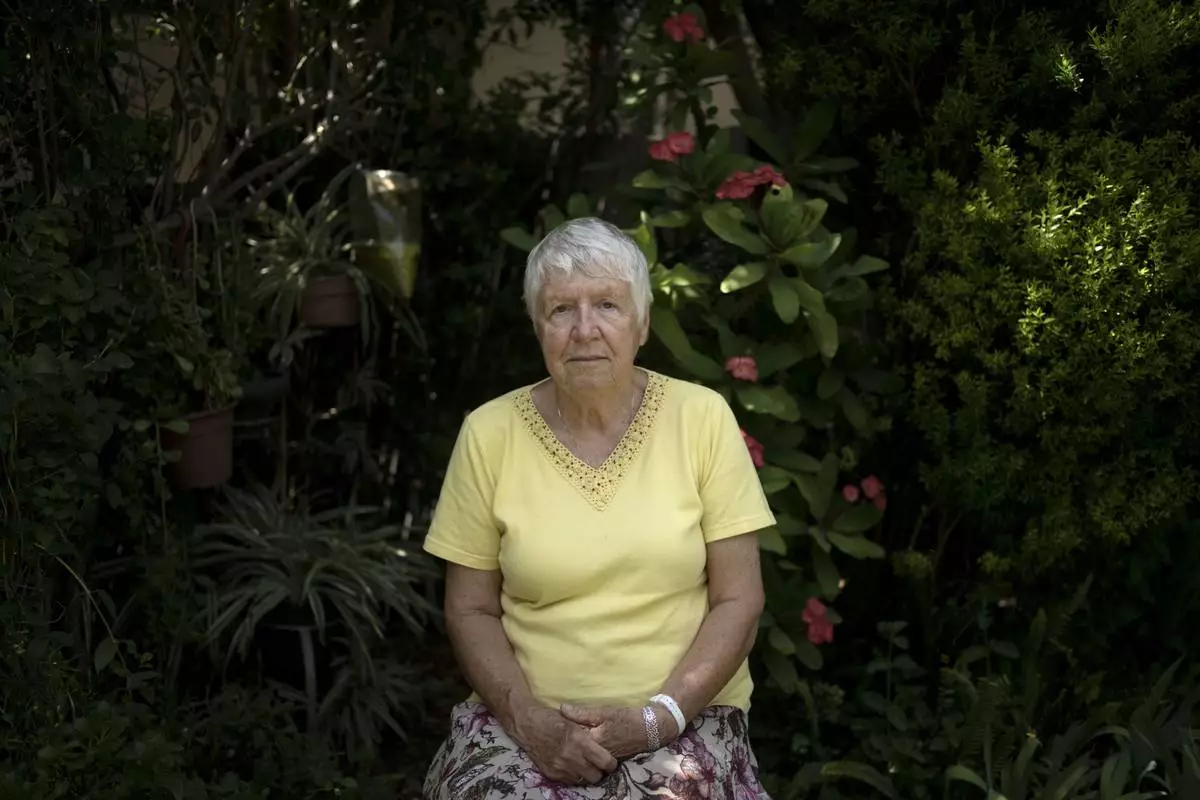
Judith Tzamir, a Holocaust survivor from Germany, poses for a portrait in her family home in Kibbutz Meflasim, southern Israel, Friday, May 3, 2024. On Monday, Tzamir will join 55 other Holocaust survivors from Israel and around the world for a memorial march in Poland, called March of the Living. (AP Photo/Maya Alleruzzo)




